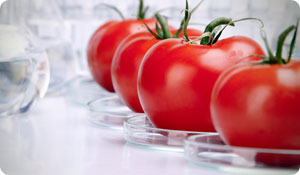
Since 1994, foods that have been genetically modified have been sold in supermarkets all over the United States and, whether you know it or not, you've probably been eating them.
Genetically engineered food crops have been a subject of debate since they first appeared on the market in the early 1990's. Those who favor the technology see it as a way to reduce the use of agricultural chemicals and feed more people. Those who are opposed, or take a more cautious approach, are concerned about the lack of regulation of genetically altered foods and the potential for health and environmental problems.
Before you read further, here is a "mini glossary" to help you bone-up on terms used in the biotechnology industry that researches and produces genetically modified crops:
- Genetic engineering: the science of introducing genetic material of one organism, such as a plant or animal, into another organism, with the goal of improving and bringing about changes in hereditary traits that would not occur naturally.
- Genetically modified food: a catch-all term used to describe food that contains an ingredient that has undergone genetic engineering.
- GMO: genetically modified organism
Genetic engineering is similar to cross-breeding, or selective breeding, with the goal of producing an animal or a plant with more desirable characteristics than the original. In the process of cross-breeding, nature eventually takes over and the desirable characteristic becomes part of the normal genetic make-up of the organism and its offspring. Future generations will naturally carry the gene that produces the desired trait, and cross-breeding is no longer necessary. In the process of genetic engineering, researchers are able to speed up the process by physically inserting genetic material taken from one plant or animal into another, rather than waiting for nature to take its course.
There are certainly pros and cons. The "pros" include the development of foods that resist disease and require less water, fertilizer and pesticides to grow. Advocates say food can be genetically altered to grow faster, contain more nutrients and stay fresh longer. The result? More people can be fed with greater quantities of healthier, better-tasting and better-looking food.
Although that sounds good on the surface, there are understandable concerns about the potential risks of growing and consuming genetically altered foods. The problem, if there is one, is the lack of research into the long-term effects on both human and environmental health and the unpredictable changes that may occur. Many questions have yet to be answered. For instance, if a plant is modified to resist frost so that it can be grown in colder climates, could this ultimately cause changes to the environment in which the plant grows? Though not likely, it is possible and it is not something that can be predicted, according to researchers at Purdue University's Department of Agricultural and Biological Engineering. Another pressing concern is the introduction of food allergens into plants that were once allergen-free.
Most of the corn and soybean plants grown in the U.S. have been genetically modified, which means any products made from these staples contain genetically modified ingredients. Since genes can "escape" and transfer to other plant crops that are in the same family, no relatives of corn or soybeans are planted close to areas where these crops are grown. Yet, there have been reports of contamination. Further modification is possible that would prevent this transfer by making the crops sterile, but the process has met with great resistance from environmental groups and the modifying gene has never been marketed.
Manufacturers are not required to provide special labeling for foods that contain genetically modified organisms. If you are concerned about genetically modified foods, look for organic foods and products label "no GMOs."
Sources:
American Institute of Biological Sciences: Genetically Modified Foods: Are They a Risk to Human/Animal Health? Web. 18 Mar 2011 http://www.actionbioscience.org/biotech/pusztai.html
"SayNoToGMOs" 2011. Web. 18 Mar 2011 http://www.saynotogmos.org/ud2011/
University of Kentucky: Food Biotechnology. Web. 18 Mar 2011. http://www.ca.uky.edu/agc/pubs/brei/brei3/brei3.pdf
University of Maryland Medical Center http://www.umm.edu/ency/article/002432.htm





